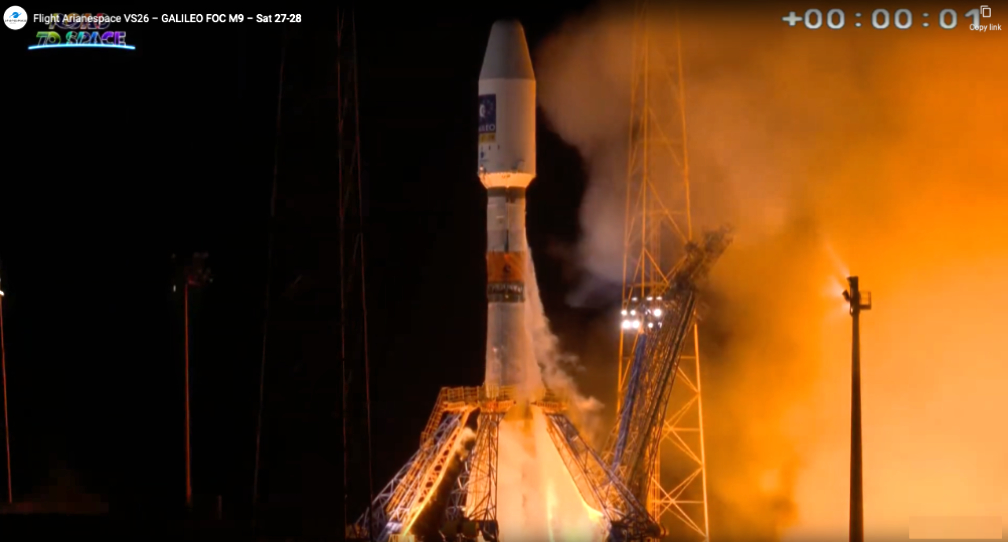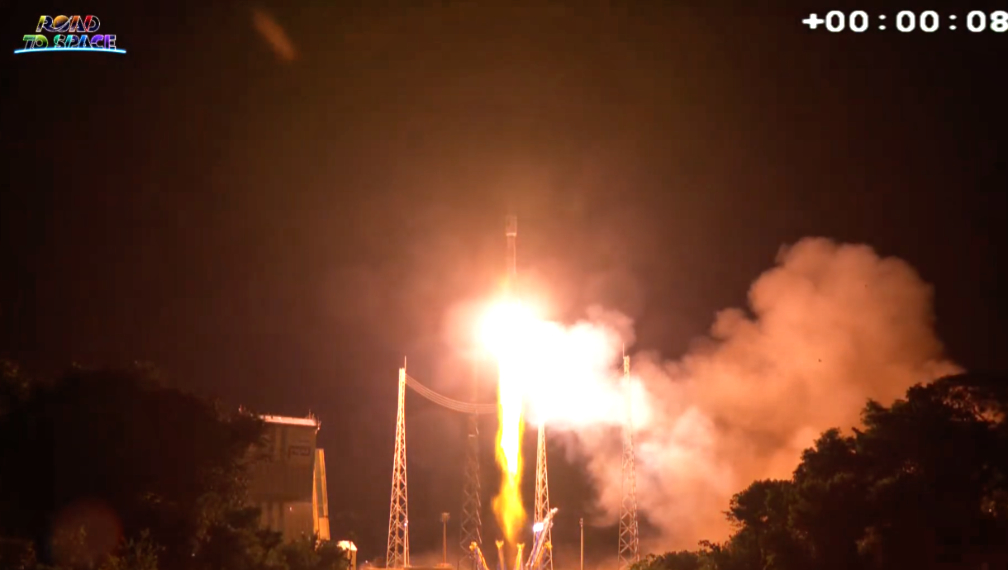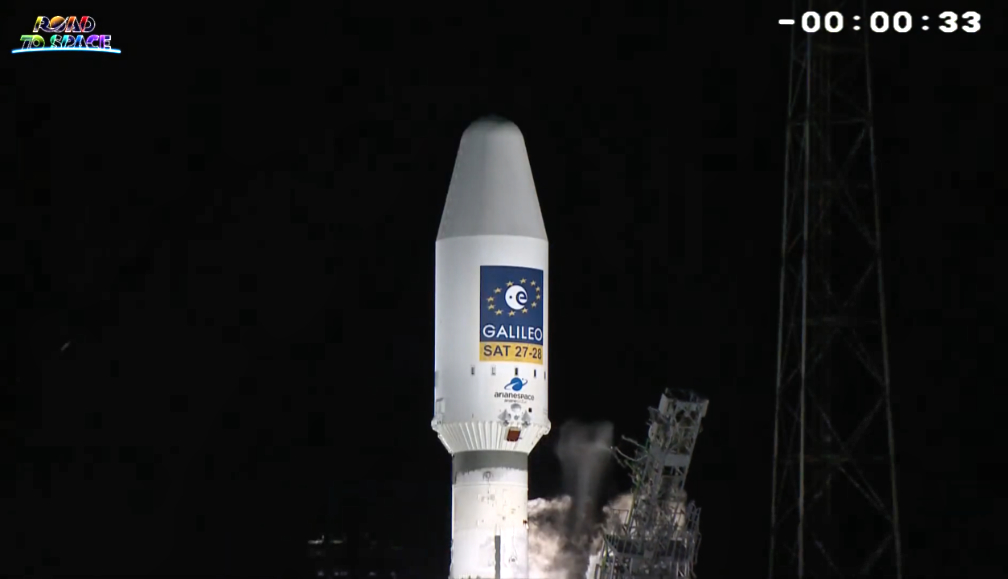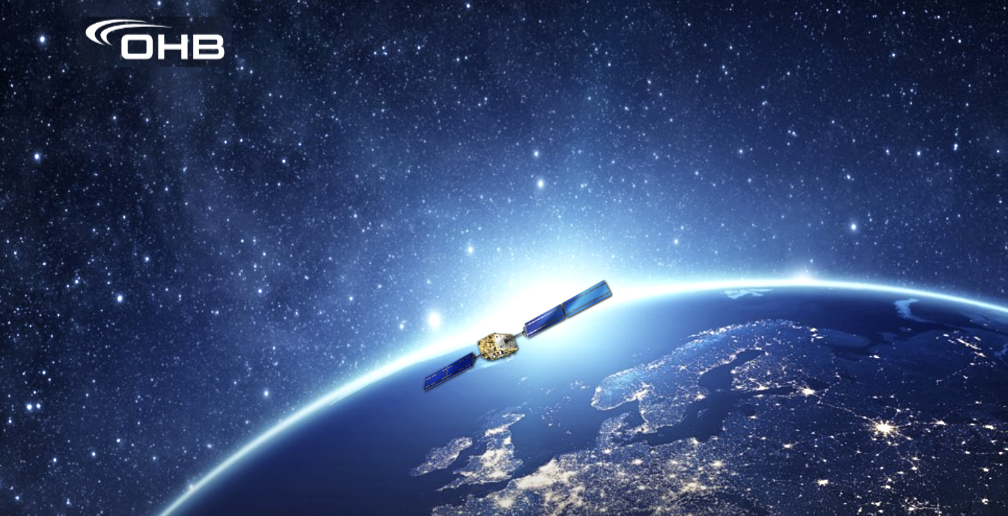
Arianespace’s 13th launch of 2021 via the 8th Soyuz mission of the year successfully launched the Galileo FOC 23-24 satellite passengers for the European Space Agency (ESA) into Medium Earth Orbit (MEO).

The launcher lifted a total payload of approximately 1,645 kg. The launch was performed from Kourou, in French Guyana, at 21:19 Kourou time, (December 5, 00:19 UTC; December 4, 7:19 p.m., EST).
Operational since 2016, Galileo is the global navigation satellite system that is fully financed and owned by the European Union. Under civilian control, it offers high-precision positioning, navigation and timing services to more than 2,3 billion users worldwide. Undertaken by a European partnership, the European Commission manages Galileo, with European Space Agency (ESA) as the design authority overseeing its development, procuring satellites and the ground segment, and the European Union Agency for the Space Program (EUSPA) overseeing Galileo operations and service provision.
The medium-lift Soyuz (produced by Progress Space Rocket Center, part of the Russian space agency Roscosmos) entered service from Europe’s Spaceport in French Guiana in October of 2011, bringing the industry’s longest-operating launcher to the world’s most modern launch base. Soyuz is a four-stage launcher, designed with extremely high reliability requirements for its use in manned missions. This flight also marks 10 years of Soyuz operations in French Guiana and its 26th mission for the European Spaceport.

“Congratulations Europe! With this 11th launch for Galileo, the constellation is now counting 28 satellites in orbit. Arianespace is proud to guarantee a secure and autonomous access to space with the deployment of Galileo, marking another step towards European independence in satellite navigation,” said Stéphane Israël, CEO of Arianespace. “I would like to thank the European Union, especially the European Commission, as well as the European Space Agency, our direct customer for this launch, for continuing to trust us with their satellites.”
Update #2 posting…
Due to adverse weather conditions (lightning), launch operations have been interrupted at H-10 minutes.
The Soyuz launch vehicle and Spacecraft are in stable and safe conditions.
The new earliest targeted launch date is December 4, 2021 at exactly:
> 07:19 p.m. Washington, D.C. time,
> 09:19 p.m. Kourou time,
> 00:19 a.m. Universal time (UTC), on December 5,
> 01:19 a.m. Paris time, on December 5,
> 03:10 a.m. Moscow time, on December 5.
The Soyuz launch vehicle and the satellites are in stable and safe conditions.
Original posting….
On Tuesday, December 1, 2021, Arianespace, the European launch service company, will operate Soyuz flight VS26 from the Guiana Space Center, Europe’s spaceport.

Two additional Galileo satellites, Galileo FOC 23-24, will be orbited on this flight performed for the benefit of the European Space Agency (ESA) acting on behalf of the European Commission.

Arianespace’s mission to provide European institutions with secure and autonomous access to space has been reaffirmed once again: VS26 will be the 150th mission launched by Arianespace for European institutions, the 46th mission of Soyuz at the service of institutional needs. This flight will also mark 10 years of Soyuz operations in French Guiana.
Out of 26 Galileo satellites already in orbit, 14 have been launched by Soyuz (produced by Progress Space Rocket Center, part of Roscosmos) between 2011 and 2016; and 12 by Ariane 5 between 2016 and 2018. VS26 will raise Galileo’s total fleet to 28 satellites, before Soyuz and Ariane 6 orbit six additional Galileo FOC satellites. The target for a full deployment of Galileo’s first generation is approximately 2025.
Galileo is the European global satellite navigation system, operational since 2016. It is the sole satellite navigation system operated under civilian control. It offers high-precision positioning, navigation and timing services to more than 2,3 billion users worldwide. By offering dual frequencies as standard, Galileo is set to deliver real-time positioning accuracy down to the meter range.
Being the largest European Union (EU) infrastructure initiative, Galileo is bringing strategic autonomy and sovereignty to the EU citizens and its Member States. Funded and fully owned by the European Union and designed by ESA, it features innovative technologies developed by European industry for the benefit of all citizens.
The Galileo satellites are built by prime contractor OHB System, with the payloads supplied by Surrey Satellite Technology Ltd (SSTL), an Airbus Defence and Space subsidiary.

The Soyuz launch vehicle family has provided reliable and efficient launch services since the start of space exploration. With the introduction of the launcher at Guiana Space Center (CSG), Soyuz is now an integral part of the European launcher fleet, together with the heavy-lift Ariane 5 and the lightweight Vega.
Arianespace uses space to make life better on Earth by providing launch services for all types of satellites into all orbits. It has orbited over 1,000 satellites since 1980, using its family of three launchers, Ariane, Soyuz and Vega, from launch sites in French Guiana (South America) and from the Russian cosmodromes in Baikonur and Vostochny. Arianespace is headquartered in Evry, near Paris, and has a technical facility at the Guiana Space Center in French Guiana, plus local offices in Washington, D.C., Tokyo and Singapore. Arianespace is a subsidiary of ArianeGroup, which holds 74% of its share capital, with the balance held by 15 other shareholders from the European launcher industry.
